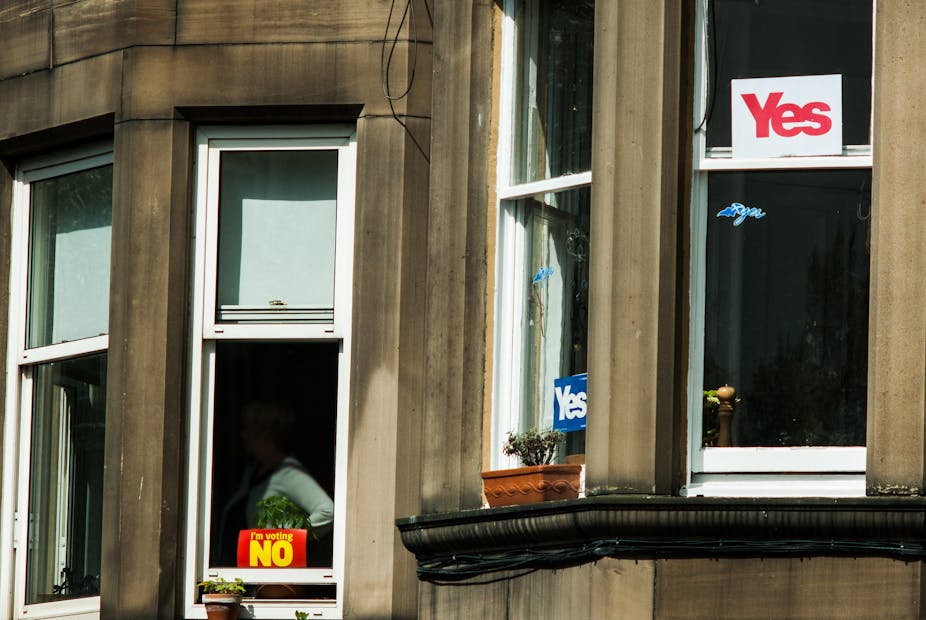The only question worth asking right now is, who’s going to win? Bookmakers’ odds should be fairly representative of movements in sentiment around the debate, so they can be a great guide to what is happening during the referendum campaign. What follows is my analysis of what the bookmakers think will be the outcome of the independence referendum, updating and deepening the piece I wrote for The Conversation a couple of weeks ago. I’ve used data from 23 bookmakers published between April 1 and September 17.
Even in the day before the vote, there is a great deal of change with the average decimal odds for a Yes vote at about 10/3 (4.3 in decimal odds), which had drifted out from less than 3/1 (or 3.9) the day before. There’s a bit of movement that isn’t quite consistent. Fourteen of the bookmakers have odds which are lengthening for a No vote, while six show odds reducing. But the typical No vote is 2/9 (1.2), so at this point there is still a fairly wide gap in the odds.
Betting on a Yes vote, May 1 to September 17

The past 30 days have seen most of the action (see figure below), which will come as no surprise. The key turn-around in the odds for the No vote happened after August 22, several days before the second TV debate that did so much for the Yes campaign. At that point the odds for Yes were in some cases further out than 5/1. Their subsequent move inwards as everything suggested Yes had the momentum hit a plateau in the period between September 7 and 10 beneath 2/1 (2.78). Then they rose back to almost 7/2, spent four days coming back in, and then moved out again in the past day – perhaps reflecting the small lead in the polls for a No vote. The odds for a No vote are now approximately where they were in early May.
The odds for a Yes vote over the past 30 days

Percentage share of the vote and turnout
But what do the bookies think the actual outcome will be, beyond backing No as the winner? If you analyse the figures, they reflect the closeness of the vote. The betting on Yes ending up with between 45% and 50% of the vote is almost evens. The chances of a lower Yes vote are greater than those of a higher Yes vote, though, according to the bookmakers. You can get about 5/2 (3.5 in decimal odds) on Yes finishing at 40% to 45%, but over 4/1 (5.1) on a 50% to 55% Yes. All the same, the chances of this kind of narrow Yes win are still higher than a heavy defeat in No’s favour. The odds of Yes finishing at 40% or lower are nudging 6/1 (6.8).
The final Yes vote (September 17 odds)

Another interesting question, which will probably affect what happens to the outcome, is turnout. As many as 97% of people have registered to vote and the received wisdom is that turnout could be 80%+.
The bookmakers think it will be higher still. The possibilities break down as follows:
Over 85%: 8/5
80%–85%: 2/1
75%–80%: 5/2
70%–75%: 9/2
65%–70%: 16/1
Geographical trends
In terms of voting for the place that is most likely to have the strongest Yes vote, Dundee has been out in front for many months, with current odds of them having the largest Yes vote at two to one (1.5). Of the areas which are the strongest Yes backers, it is difficult to generalise. But the Highland areas and the west of Scotland tend in that direction strongest, while the south, east and northern isles are least keen on independence. Overall the major population areas on the east coast of Scotland, apart from Dundee, are generally in the bottom half of the geographical split.

As useful as all this analysis is in tracking sentiment, it must be said there is a strange dynamic going on in the betting market. The polls are saying it is close, but the bookmakers are not reflecting that. It is a reminder that, just like with the opinion polls, bookmaker odds are only best guesses on what will happen – and are swayed by customer demand. It has been a vote in which most of the printed media outlets have backed the No campaign, but in these days of social media, they are not necessarily the main outlets for information or the best reflections of what has been happening.
To end on a disappointing note, Betfair has already started to pay out on a No vote, as they reckon it is 78% certain. In fact, that’s the odds of not pulling out the ace of spades from among four ace cards. I may do maths and not politics, but I do understand that 78% is nowhere near certain. Will they end up looking stupid after the announcement? We won’t have to wait long to find out.

